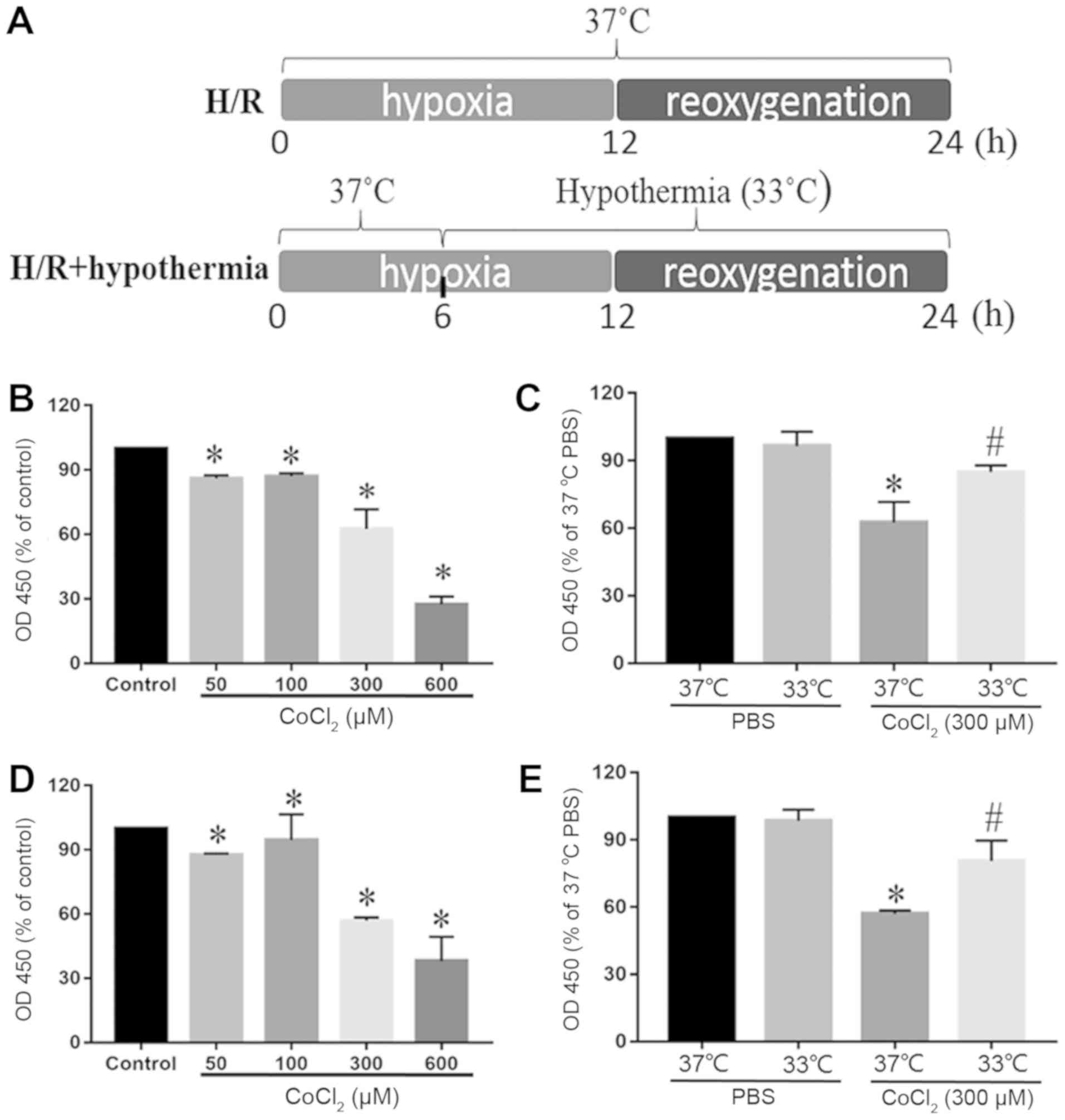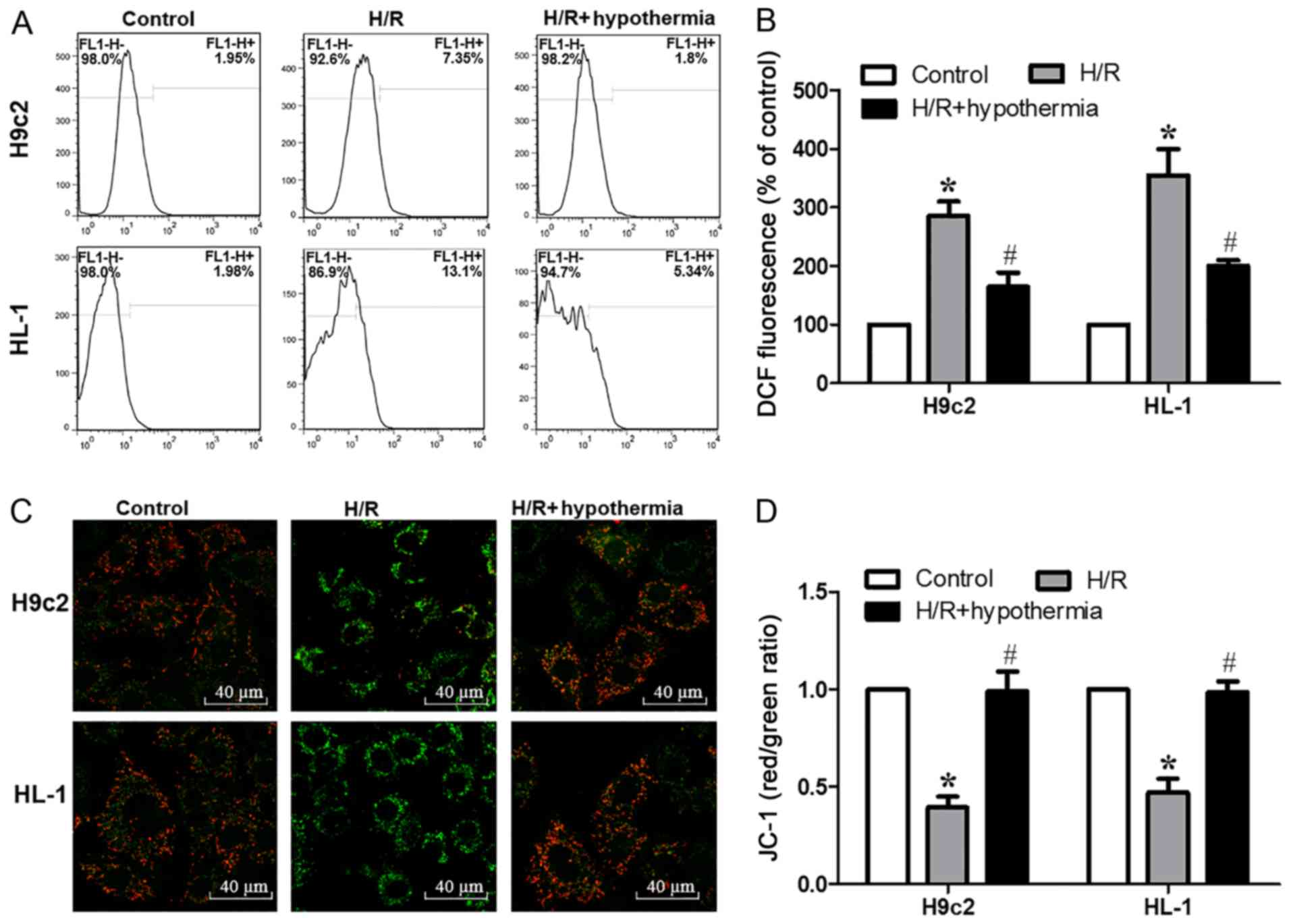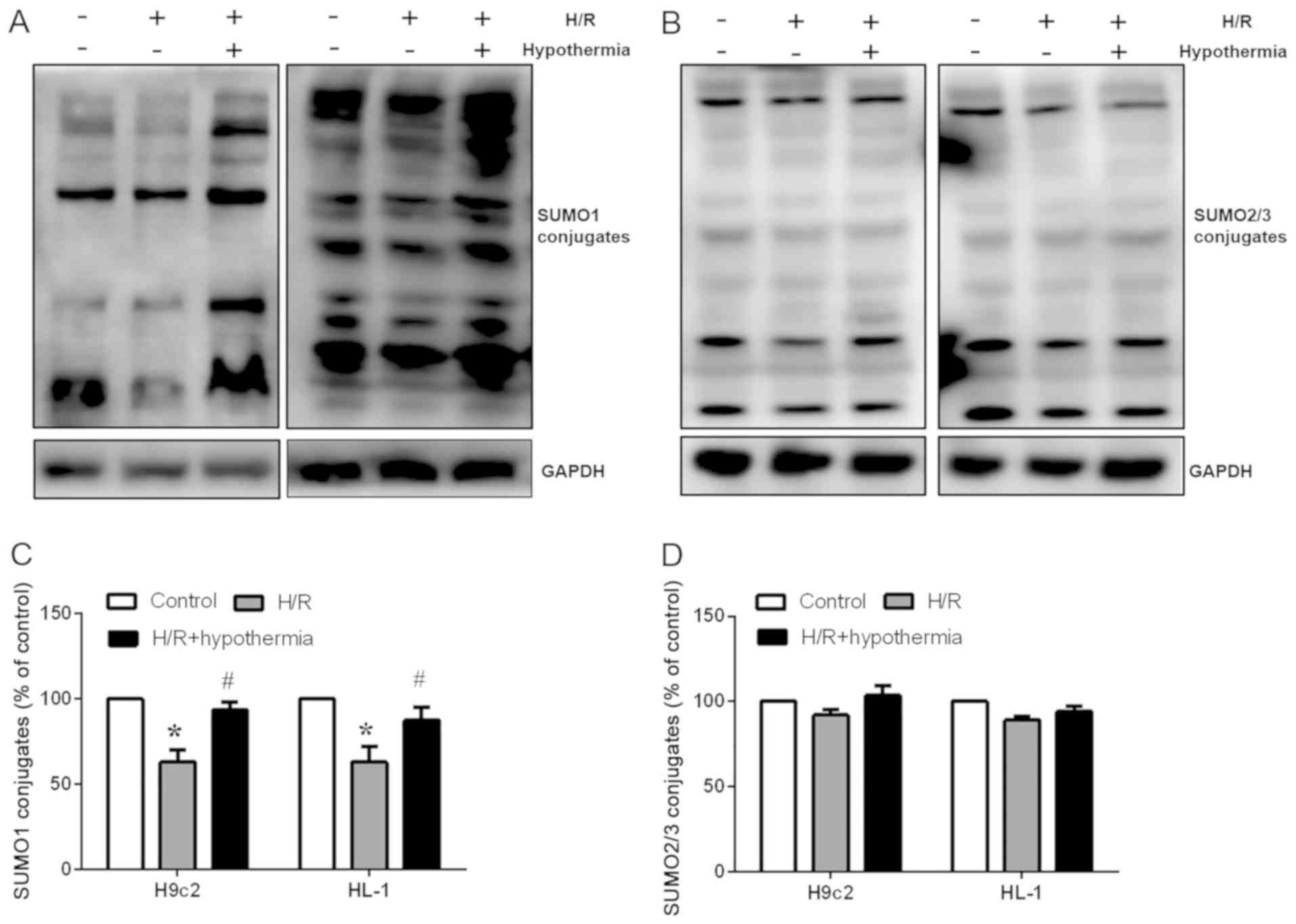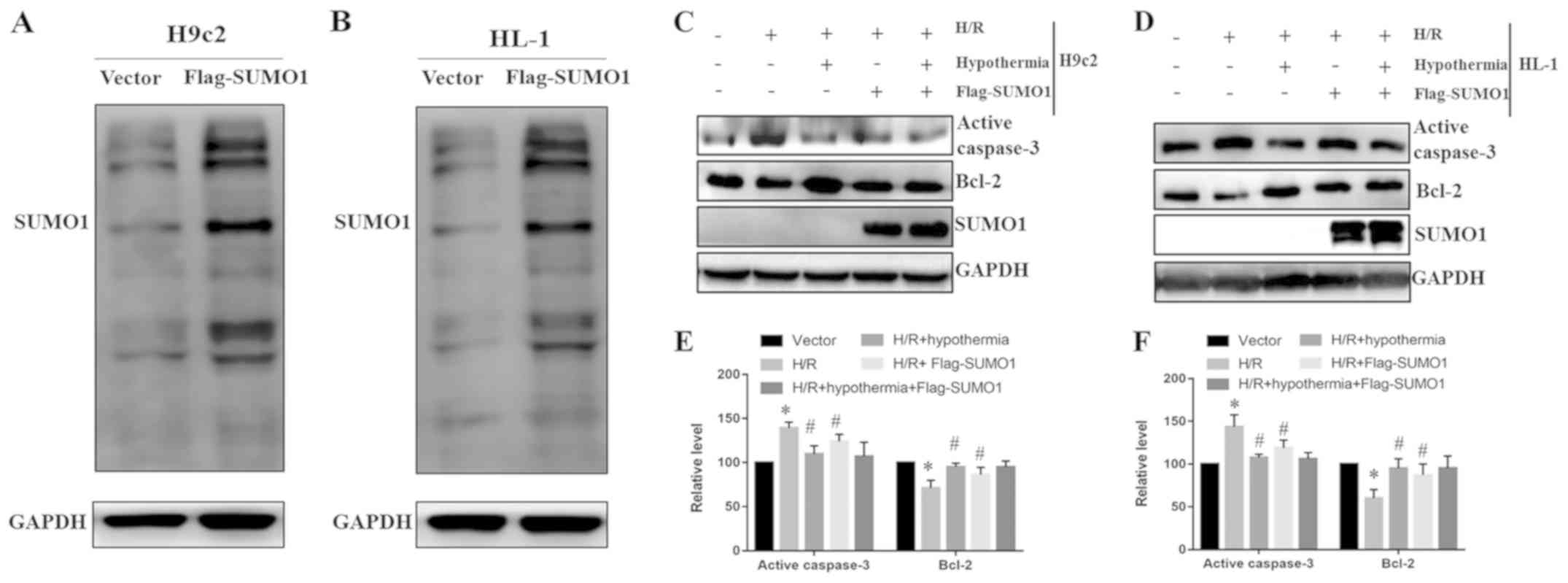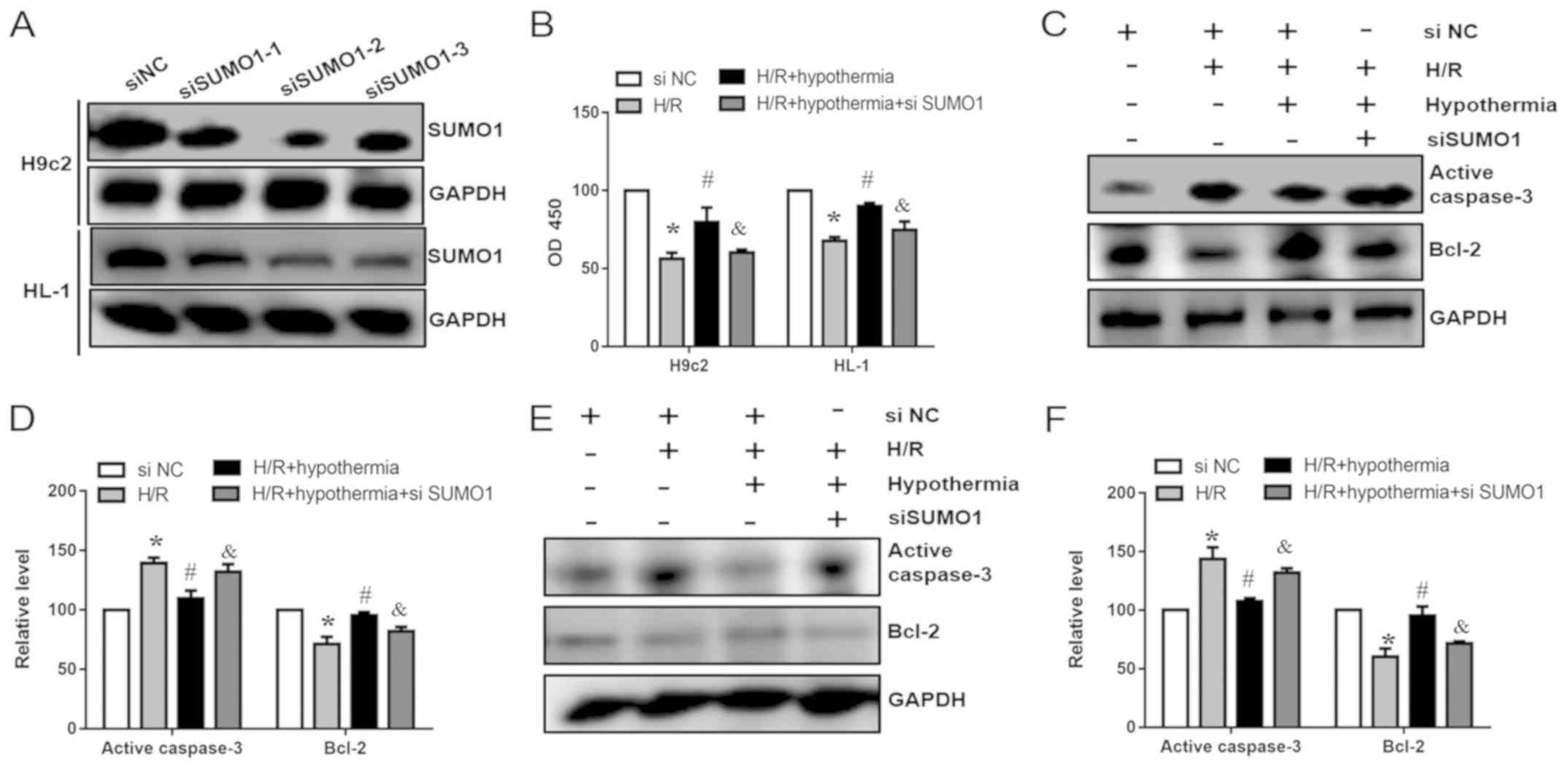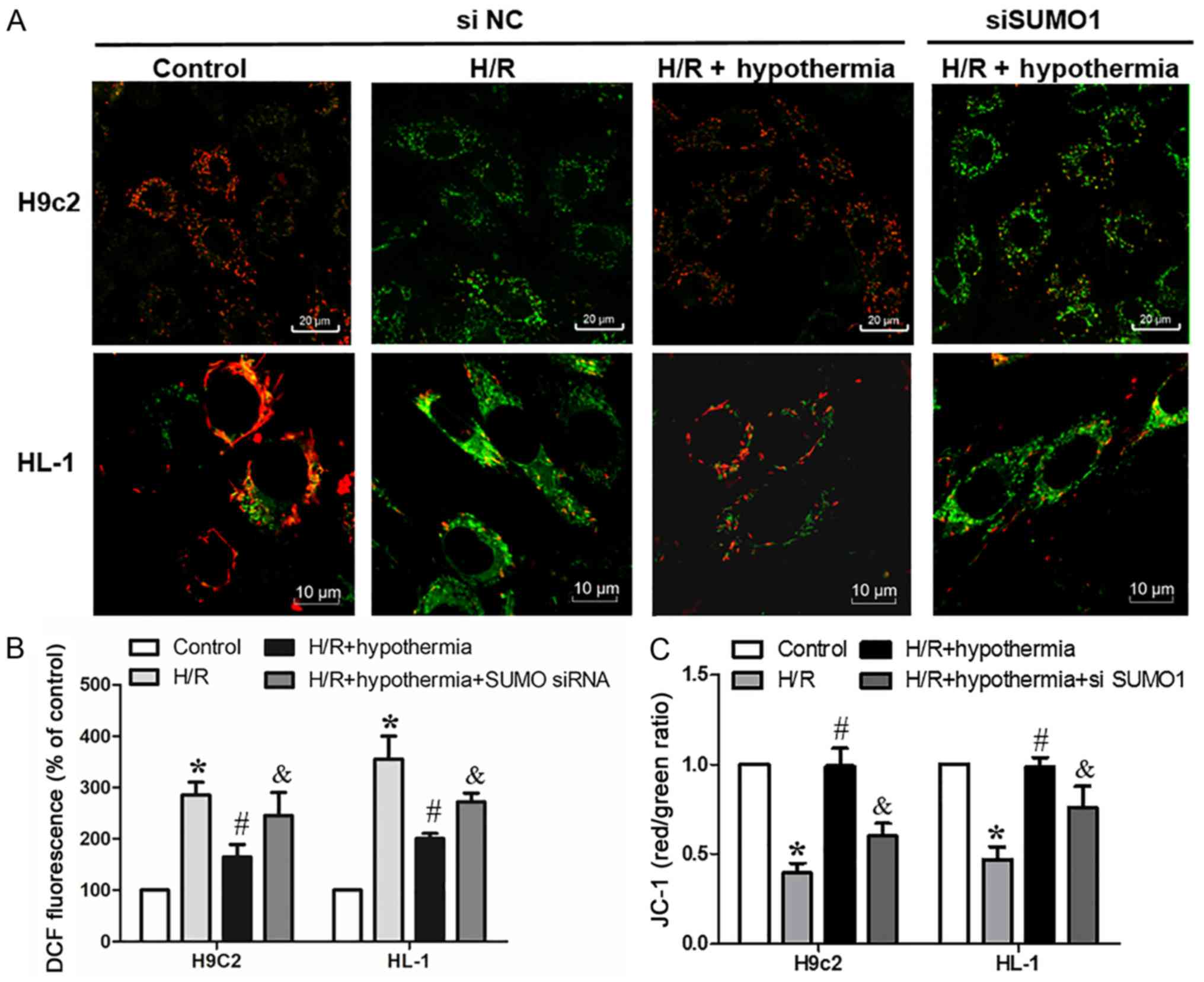|
1
|
Nowbar AN, Howard JP, Finegold JA, Asaria
P and Francis DP: 2014 global geographic analysis of mortality from
ischaemic heart disease by country, age and income: Statistics from
World Health Organisation and United Nations. Int J Cardiol.
174:2617–298. 2014. View Article : Google Scholar
|
|
2
|
Joiner ML, Koval OM, Li J, He BJ,
Allamargot C, Gao Z, Luczak ED, Hall DD, Fink BD, Chen B, et al:
CaMKII determines mitochondrial stress responses in heart. Nature.
491:269–273. 2012. View Article : Google Scholar : PubMed/NCBI
|
|
3
|
Inoue T: Ischemia-reperfusion injury is
still a big hurdle to overcome for treatment of acute myocardial
infarction. J Cardiol. 67:305–306. 2016. View Article : Google Scholar : PubMed/NCBI
|
|
4
|
Mandl A, Toth A and Erhardt P: Analysis of
apoptosis in isolated primary cardiac myocytes. Methods Mol Biol.
559:293–311. 2009. View Article : Google Scholar : PubMed/NCBI
|
|
5
|
Kuznetsov AV, Javadov S, Sickinger S,
Frotschnig S and Grimm M: H9c2 and HL-1 cells demonstrate distinct
features of energy metabolism, mitochondrial function and
sensitivity to hypoxia-reoxygenation. Biochim Biophys Acta.
1853:276–284. 2015. View Article : Google Scholar : PubMed/NCBI
|
|
6
|
Azzopardi DV, Strohm B, Edwards AD, Dyet
L, Halliday HL, Juszczak E, Kapellou O, Levene M, Marlow N, Porter
E, et al TOBY Study Group, : Moderate hypothermia to treat
perinatal asphyxial encephalopathy. N Engl J Med. 361:1349–1358.
2009. View Article : Google Scholar : PubMed/NCBI
|
|
7
|
Bernard S, Buist M, Monteiro O and Smith
K: Induced hypothermia using large volume, ice-cold intravenous
fluid in comatose survivors of out-of-hospital cardiac arrest: A
preliminary report. Resuscitation. 56:9–13. 2003. View Article : Google Scholar : PubMed/NCBI
|
|
8
|
Götberg M, Olivecrona GK, Engblom H,
Ugander M, van der Pals J, Heiberg E, Arheden H and Erlinge D:
Rapid short-duration hypothermia with cold saline and endovascular
cooling before reperfusion reduces microvascular obstruction and
myocardial infarct size. BMC Cardiovasc Disord. 8:72008. View Article : Google Scholar : PubMed/NCBI
|
|
9
|
Tissier R, Couvreur N, Ghaleh B, Bruneval
P, Lidouren F, Morin D, Zini R, Bize A, Chenoune M, Belair MF, et
al: Rapid cooling preserves the ischaemic myocardium against
mitochondrial damage and left ventricular dysfunction. Cardiovasc
Res. 83:345–353. 2009. View Article : Google Scholar : PubMed/NCBI
|
|
10
|
Erlinge D, Götberg M, Lang I, Holzer M,
Noc M, Clemmensen P, Jensen U, Metzler B, James S, Bötker HE, et
al: Rapid endovascular catheter core cooling combined with cold
saline as an adjunct to percutaneous coronary intervention for the
treatment of acute myocardial infarction. The CHILL-MI trial: A
randomized controlled study of the use of central venous catheter
core cooling combined with cold saline as an adjunct to
percutaneous coronary intervention for the treatment of acute
myocardial infarction. J Am Coll Cardiol. 63:1857–1865. 2014.
View Article : Google Scholar : PubMed/NCBI
|
|
11
|
Götberg M, Olivecrona GK, Koul S, Carlsson
M, Engblom H, Ugander M, van der Pals J, Algotsson L, Arheden H and
Erlinge D: A pilot study of rapid cooling by cold saline and
endovascular cooling before reperfusion in patients with
ST-elevation myocardial infarction. Circ Cardiovasc Interv.
3:400–407. 2010. View Article : Google Scholar : PubMed/NCBI
|
|
12
|
Zhong N, Kim CY, Rizzu P, Geula C, Porter
DR, Pothos EN, Squitieri F, Heutink P and Xu J: DJ-1
transcriptionally up-regulates the human tyrosine hydroxylase by
inhibiting the sumoylation of pyrimidine tract-binding
protein-associated splicing factor. J Biol Chem. 281:20940–20948.
2006. View Article : Google Scholar : PubMed/NCBI
|
|
13
|
Gareau JR and Lima CD: The SUMO pathway:
Emerging mechanisms that shape specificity, conjugation and
recognition. Nat Rev Mol Cell Biol. 11:861–871. 2010. View Article : Google Scholar : PubMed/NCBI
|
|
14
|
Prudden J, Perry JJP, Arvai AS, Tainer JA
and Boddy MN: Molecular mimicry of SUMO promotes DNA repair. Nat
Struct Mol Biol. 16:509–516. 2009. View Article : Google Scholar : PubMed/NCBI
|
|
15
|
Wang Z and Prelich G: Quality control of a
transcriptional regulator by SUMO-targeted degradation. Mol Cell
Biol. 29:1694–1706. 2009. View Article : Google Scholar : PubMed/NCBI
|
|
16
|
Flotho A and Melchior F: Sumoylation: A
regulatory protein modification in health and disease. Annu Rev
Biochem. 82:357–385. 2013. View Article : Google Scholar : PubMed/NCBI
|
|
17
|
Kim EY, Zhang Y, Beketaev I, Segura AM, Yu
W, Xi Y, Chang J and Wang J: SENP5, a SUMO isopeptidase, induces
apoptosis and cardiomyopathy. J Mol Cell Cardiol. 78:154–164. 2015.
View Article : Google Scholar : PubMed/NCBI
|
|
18
|
Kim EY, Zhang Y, Ye B, Segura AM, Beketaev
I, Xi Y, Yu W, Chang J, Li F and Wang J: Involvement of activated
SUMO-2 conjugation in cardiomyopathy. Biochim Biophys Acta.
1852:1388–1399. 2015. View Article : Google Scholar : PubMed/NCBI
|
|
19
|
Cai R, Gu J, Sun H, Liu X, Mei W, Qi Y,
Xue S, Ren S, Rabinowitz JE, Wang Y, et al: Induction of SENP1 in
myocardium contributes to abnormities of mitochondria and
cardiomyopathy. J Mol Cell Cardiol. 79:115–122. 2015. View Article : Google Scholar : PubMed/NCBI
|
|
20
|
Kim EY, Chen L, Ma Y, Yu W, Chang J,
Moskowitz IP and Wang J: Enhanced desumoylation in murine hearts by
overexpressed SENP2 leads to congenital heart defects and cardiac
dysfunction. J Mol Cell Cardiol. 52:638–649. 2012. View Article : Google Scholar : PubMed/NCBI
|
|
21
|
Montgomery RL, Davis CA, Potthoff MJ,
Haberland M, Fielitz J, Qi X, Hill JA, Richardson JA and Olson EN:
Histone deacetylases 1 and 2 redundantly regulate cardiac
morphogenesis, growth, and contractility. Genes Dev. 21:1790–1802.
2007. View Article : Google Scholar : PubMed/NCBI
|
|
22
|
Joung H, Kwon S, Kim KH, Lee YG, Shin S,
Kwon DH, Lee YU, Kook T, Choe N, Kim JC, et al: Sumoylation of
histone deacetylase 1 regulates MyoD signaling during myogenesis.
Exp Mol Med. 50:e4272018. View Article : Google Scholar : PubMed/NCBI
|
|
23
|
Lee YJ, Mou Y, Klimanis D, Bernstock JD
and Hallenbeck JM: Global SUMOylation is a molecular mechanism
underlying hypothermia-induced ischemic tolerance. Front Cell
Neurosci. 8:4162014. View Article : Google Scholar : PubMed/NCBI
|
|
24
|
Liu X, Ren W, Jiang Z, Su Z, Ma X, Li Y,
Jiang R, Zhang J and Yang X: Hypothermia inhibits the proliferation
of bone marrow-derived mesenchymal stem cells and increases
tolerance to hypoxia by enhancing SUMOylation. Int J Mol Med.
40:1631–1638. 2017.PubMed/NCBI
|
|
25
|
Wei Y and Qing M: G Burkhard M and Wulf P:
Deep hypothermia markedly activates the small ubiquitin-like
modifier conjugation pathway; implications for the fate of cells
exposed to transient deep hypothermic cardiopulmonary bypass. J
Cereb Blood Flow Metab (Nihongoban). 29:886–890. 2009. View Article : Google Scholar
|
|
26
|
Nolan JP, Soar J, Cariou A, Cronberg T,
Moulaert VR, Deakin CD, Bottiger BW, Friberg H, Sunde K and
Sandroni C: European Resuscitation Council and European Society of
Intensive Care Medicine Guidelines for Post-resuscitation Care
2015: Section 5 of the European Resuscitation Council Resuscitation
Guidelines 2015. Resuscitation. 81:1389–1399. 2015.
|
|
27
|
Lesley C, Yi D, Rita K, Karin P and
Sanderson TH: Mitochondrial dynamics: An emerging paradigm in
ischemia-reperfusion injury. Curr Pharm Des. 19:6848–6857. 2013.
View Article : Google Scholar : PubMed/NCBI
|
|
28
|
Requião-Moura LR, Durão Junior MS, Matos
AC and Pacheco-Silva A: Ischemia and reperfusion injury in renal
transplantation: Hemodynamic and immunological paradigms. Einstein
(Sao Paulo). 13:129–135. 2015. View Article : Google Scholar : PubMed/NCBI
|
|
29
|
Huang CH, Chiang CY, Pen RH, Tsai MS, Chen
HW, Hsu CY, Wang TD, Ma MH, Chen SC and Chen WJ: Hypothermia
treatment preserves mitochondrial integrity and viability of
cardiomyocytes after ischaemic reperfusion injury. Injury.
46:233–239. 2015. View Article : Google Scholar : PubMed/NCBI
|
|
30
|
Prudent J, Zunino R, Sugiura A, Mattie S,
Shore GC and McBride HM: MAPL SUMOylation of Drp1 stabilizes an
ER/mitochondrial platform required for cell death. Mol Cell.
59:941–955. 2015. View Article : Google Scholar : PubMed/NCBI
|
|
31
|
Drescher C, Diestel A, Wollersheim S,
Berger F and Schmitt KR: How does hypothermia protect
cardiomyocytes during cardioplegic ischemia? Eur J Cardiothorac
Surg. 40:352–359. 2011.PubMed/NCBI
|
|
32
|
Krech J, Tong G, Wowro S, Walker C,
Rosenthal LM, Berger F and Schmitt KR: Moderate therapeutic
hypothermia induces multimodal protective effects in oxygen-glucose
deprivation/reperfusion injured cardiomyocytes. Mitochondrion.
35:1–10. 2017. View Article : Google Scholar : PubMed/NCBI
|
|
33
|
Ashraf H, Pradhan L, Chang EI, Terada R,
Ryan NJ, Briggs LE, Chowdhury R, Zárate MA, Sugi Y, Nam HJ, et al:
A mouse model of human congenital heart disease: High incidence of
diverse cardiac anomalies and ventricular noncompaction produced by
heterozygous Nkx2-5 homeodomain missense mutation. Circ Cardiovasc
Genet. 7:423–433. 2014. View Article : Google Scholar : PubMed/NCBI
|
|
34
|
Iribarren PA, Berazategui MA, Bayona JC,
Almeida IC, Cazzulo JJ and Alvarez VE: Different proteomic
strategies to identify genuine Small Ubiquitin-like MOdifier
targets and their modification sites in Trypanosoma brucei
procyclic forms. Cell Microbiol. 17:1413–1422. 2015. View Article : Google Scholar : PubMed/NCBI
|
|
35
|
Jin LZ, Lu JS and Gao JW: Silencing SUMO2
promotes protection against degradation and apoptosis of nucleus
pulposus cells through p53 signaling pathway in intervertebral disc
degeneration. Biosci Rep. 38:BSR201715232018. View Article : Google Scholar : PubMed/NCBI
|
|
36
|
Hay RT: SUMO-specific proteases: A twist
in the tail. Trends Cell Biol. 17:370–376. 2007. View Article : Google Scholar : PubMed/NCBI
|
|
37
|
Yang W, Sheng H, Warner DS and Paschen W:
Transient global cerebral ischemia induces a massive increase in
protein sumoylation. J Cereb Blood Flow Metab. 28:269–279. 2008.
View Article : Google Scholar : PubMed/NCBI
|
|
38
|
Datwyler AL, Lättig-Tünnemann G, Yang W,
Paschen W, Lee SL, Dirnagl U, Endres M and Harms C: SUMO2/3
conjugation is an endogenous neuroprotective mechanism. J Cereb
Blood Flow Metab. 31:2152–2159. 2011. View Article : Google Scholar : PubMed/NCBI
|
|
39
|
Li G, Liu X, Su Z and Zhang D: Hypothermia
exerts early neuroprotective effects involving protein conjugation
of SUMO 2/3 in a rat model of middle cerebral artery occlusion. Mol
Med Rep. 16:3217–3223. 2017. View Article : Google Scholar : PubMed/NCBI
|
|
40
|
Shimizu Y, Lambert JP, Nicholson CK, Kim
JJ, Wolfson DW, Cho HC, Husain A, Naqvi N, Chin LS, Li L, et al:
DJ-1 protects the heart against ischemia-reperfusion injury by
regulating mitochondrial fission. J Mol Cell Cardiol. 97:56–66.
2016. View Article : Google Scholar : PubMed/NCBI
|
|
41
|
Lee A, Jeong D, Mitsuyama S, Oh JG, Liang
L, Ikeda Y, Sadoshima J, Hajjar RJ and Kho C: The role of SUMO-1 in
cardiac oxidative stress and hypertrophy. Antioxid Redox Signal.
21:1986–2001. 2014. View Article : Google Scholar : PubMed/NCBI
|
|
42
|
Shao R, Zhang F-P, Tian F, Friberg PA,
Wang X, Sjöland H and Billig H: Increase of SUMO-1 expression in
response to hypoxia: Direct interaction with HIF-1α in adult mouse
brain and heart in vivo. FEBS Lett. 569:293–300. 2004. View Article : Google Scholar : PubMed/NCBI
|
|
43
|
Wang L, Ma Q, Yang W, Mackensen GB and
Paschen W: Moderate hypothermia induces marked increase in levels
and nuclear accumulation of SUMO2/3-conjugated proteins in neurons.
J Neurochem. 123:349–359. 2012. View Article : Google Scholar : PubMed/NCBI
|
|
44
|
Blatt A, Elbaz-Greener GA, Mizrachi A,
J'bara Z, Taraboulos T, Litovchik I, Vered Z and Minha S:
Adjunctive mild hypothermia therapy to primary percutaneous
coronary intervention in patients with ST segment elevation
myocardial infarction complicated with cardiogenic shock: A pilot
feasibility study. Cardiol J. 22:285–289. 2015. View Article : Google Scholar : PubMed/NCBI
|
|
45
|
Tong G, Walker C, Bührer C, Berger F,
Miera O and Schmitt KR: Moderate hypothermia initiated during
oxygen-glucose deprivation preserves HL-1 cardiomyocytes.
Cryobiology. 70:101–108. 2015. View Article : Google Scholar : PubMed/NCBI
|
|
46
|
Yang D, Guo S, Zhang T and Li H:
Hypothermia attenuates ischemia/reperfusion-induced endothelial
cell apoptosis via alterations in apoptotic pathways and JNK
signaling. FEBS Lett. 583:2500–2506. 2009. View Article : Google Scholar : PubMed/NCBI
|
|
47
|
Ning XH, Chen SH, Xu CS, Li L, Yao LY,
Qian K, Krueger JJ, Hyyti OM and Portman MA: Hypothermic protection
of the ischemic heart via alterations in apoptotic pathways as
assessed by gene array analysis. J Appl Physiol (1985).
92:2200–2207. 2002. View Article : Google Scholar : PubMed/NCBI
|
|
48
|
Zhang C, Liu X, Miao J, Wang S, Wu L, Yan
D, Li J, Guo W, Wu X and Shen A: Heat shock protein 70 protects
cardiomyocytes through suppressing SUMOylation and nucleus
translocation of phosphorylated eukaryotic elongation factor 2
during myocardial ischemia and reperfusion. Apoptosis. 22:608–625.
2017. View Article : Google Scholar : PubMed/NCBI
|
|
49
|
Vogel S, Rath D, Lu J, Chatterjee M,
Geisler T and Gawaz M: Elevated mitochondrial membrane potential of
circulating monocyte-platelet aggregates in patients with coronary
heart disease. Int J Cardiol. 181:135–137. 2015. View Article : Google Scholar : PubMed/NCBI
|
|
50
|
Mohammad MA, Noc M, Lang I, Holzer M,
Clemmensen P, Jensen U, Metzler B and Erlinge D: Proteomics in
hypothermia as adjunctive therapy in patients with ST-segment
elevation myocardial infarction: A CHILL-MI substudy. Ther
Hypothermia Temp Manag. 7:152–161. 2017. View Article : Google Scholar : PubMed/NCBI
|
|
51
|
Cheng BC, Huang HS, Chao CM, Hsu CC, Chen
CY and Chang CP: Hypothermia may attenuate
ischemia/reperfusion-induced cardiomyocyte death by reducing
autophagy. Int J Cardiol. 168:2064–2069. 2013. View Article : Google Scholar : PubMed/NCBI
|















